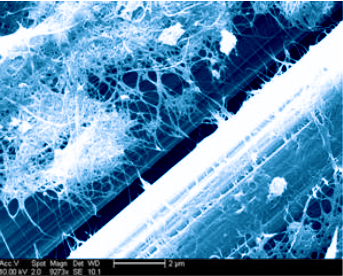The University of California, San Diego engineers are exploring the ways of using carbon nanotubes for strengthening the resin matrix present in composites, a material broadly utilized in the sporting goods, automotive, defense and aerospace industries.
 The carbon nanotubes can be seen in the resin matrix, bonding to the carbon fibers. This image was taken using a Scanning Electron Microscope in the Nano3 research facility, at the University of California, San Diego. The two large fibers seen in the image are the carbon fibers which are nearly 20 times smaller than the average diameter of a human hair. The smaller strands connecting the adjacent carbon fibers are the nanotubes which are approximately 50,000 times smaller than the average diameter of a human hair.
The carbon nanotubes can be seen in the resin matrix, bonding to the carbon fibers. This image was taken using a Scanning Electron Microscope in the Nano3 research facility, at the University of California, San Diego. The two large fibers seen in the image are the carbon fibers which are nearly 20 times smaller than the average diameter of a human hair. The smaller strands connecting the adjacent carbon fibers are the nanotubes which are approximately 50,000 times smaller than the average diameter of a human hair.
The key objectives of the work include the development of custom-designed carbon nanotubes and the development of a technique to insert these high-performance nanomaterials in crucial stress regions of the resin matrix, which is the weakest link in the structure of composite materials. This meaningful difference in strength between the resin and the fibers it holds together causes structural failure in composites when under shear loading or compression.
Engineers at the UC San Diego Department of NanoEngineering together with researchers at the Composites and Aerospace Structures Laboratory are currently working on the ways of improving the reinforcement of the resin matrix using nanotubes. They have carried out a few experimental tests. What they found was it is possible to significantly improve the reinforcing strength of the resin matrix through the insertion of the carbon nanotubes.
However, since these carbon nanotubes are expensive compared to the composite (carbon/epoxy) laminates, it is not feasible to insert the nanomaterials across the whole structure. Hence, the researchers are developing new fabrication techniques that enable the insertion of the nanoparticles only in key stress regions. They are devising a variety of insertion techniques based on the various fabrication techniques employed in different composite industries.
Ben Martins, a Ph.D. student at the Jacobs School, is the lead scientist who works under the direction of Ken Vecchio, professor and chair of the NanoEngineering department at the Jacobs School, and John Kosmatka, a professor of structural engineering at the Jacobs School of Engineering.
The project is in its initial stages and will get benefited from the launch of the Jacobs School’s new Structural and Materials Engineering Building at which Vecchio’s and Kosmatka’s labs are situated.